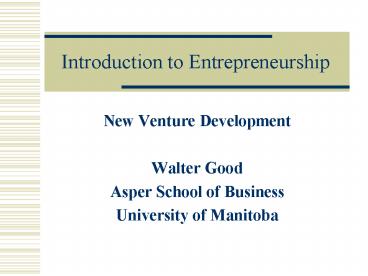Introduction to Entrepreneurship - PowerPoint PPT Presentation
1 / 24
Title:
Introduction to Entrepreneurship
Description:
Firms with fewer than 20 employees currently create almost 95% of net new jobs. ... Turning a Business Dream into Reality. Commitment, Determination, and Perseverance ... – PowerPoint PPT presentation
Number of Views:224
Avg rating:3.0/5.0
Title: Introduction to Entrepreneurship
1
Introduction to Entrepreneurship
- New Venture Development
- Walter Good
- Asper School of Business
- University of Manitoba
2
What is Entrepreneurship?
- Researchers have been very inconsistent in their
definitions of entrepreneurship. Definitions
have emphasized a broad range of activities
including - The creation of organizations
- The carrying out of new combinations
- The exploration of opportunities
- The bearing of uncertainty
- The bringing together of factors of production
- And others
3
Some Examples
- Richard Cantillon (circa 1730)
- Self-employment of any sort. Entrepreneurs buy
at certain prices in the present and sell at
uncertain prices in the future. The entrepreneur
is a bearer of uncertainty.
4
- Jean Baptiste Say (1816)
- The entrepreneur is the agent who unites all
means of production and who finds in the value of
the productsthe reestablishment of the entire
capital he employs, and the value of the wages,
the interest, and the rent which he pays, as well
as profits belonging to himself.
5
- Joseph Schumpter (1934)
- The entrepreneur is the innovator who implements
change within markets through the carrying out of
new combinations. As such, the entrepreneur moves
the market away from equilibrium
6
- Penrose (1963)
- Entrepreneurial activity involves identifying
opportunities within the economic system.
Managerial capacities are different from
entrepreneurial capacities.
7
- Kirzner (1979)
- The entrepreneur recognizes and acts upon market
opportunities. The entrepreneur is essentially an
arbitrageur.
8
- Gartner (1988)
- The creation of new organizations
9
- Timmons (1994)
- Entrepreneurship is creating something of value
from practically nothing
10
- Bygraves (1997)
- An entrepreneur is someone who perceives an
opportunity and creates an organization to pursue
it
11
- There is no single accepted definition of
entrepreneurship. - Small business?
- Micro business?
- Corporate entrepreneurship or intrapreneurship?
- High-growth firms?
- Family businesses?
- Franchises?
12
Entrepreneurship Economic Thought
Joseph Schumpeter (1930s)
Israel Kirzner (1970s)
S
S
D
D
CREATIVE DESTRUCTION Entrepreneurship moves
market away from equilibrium
ENTREPRENEURIAL DISCOVERY Entrepreneurship
moves market toward equilibrium.
New combinations new goods, methods of
production, new markets, sources of supply,
organizations.
Entrepreneur alert to opportunities that already
exist and are waiting to be noticed.
13
Entrepreneurs Can Play a Number of Roles in the
Economy
1. Create new product and/or service
businesses. 2. Bring creative and innovative
methods to developing or producing new products
or services. 3. Provide employment opportunities
and create new jobs as a result of growing their
businesses consistently and rapidly. 4. Help
contribute to regional and national economic
growth. 5. Encourage greater industrial
efficiency/productivity to enhance our
international competitiveness.
14
Some Facts About Entrepreneurship
- 1998 adult working population was 130 million,
17.3 or 21 million were self-employed - Since WWII small entrepreneurial firms have been
responsible for ½ of all innovation and 95 of
all radical innovation.
15
Entrepreneurship Drives Job Wealth Creation.
- Since 1980, large companies have lost more than
5M jobs, but 34M new jobs have been created. - At any point in time, 8.5 of the adult
population is starting a new business. - In 1950s 50,000 businesses were incorporated per
year. 770,000 businesses were incorporated in
1998.
Small businesses are the backbone of the North
American Economy. They create 2 of every 3 new
jobs and produce 39 of the GNP.
16
- Firms with fewer than 20 employees currently
create almost 95 of net new jobs. - Increasingly women are questioning traditional
corporate jobs to seek their careers in
entrepreneurship. - People in their 50s or 60s are planning second
careers as entrepreneurs rather than retiring. - The vast majority or nearly 3 million
millionaires accumulated their wealth through
entrepreneurial ventures.
17
The Components of Successful Entrepreneurial
Ventures
18
Outline of the Entrepreneurial Process
19
Myths About Entrepreneurship
Myth 1 Entrepreneurs are born, not made. Myth
2 Anyone can start a business. Its just a matter
of luck and guts. Myth 3 Entrepreneurs are
gamblers. Myth 4 Entrepreneurs want to run the
whole show themselves. Myth 5 Entrepreneurs are
their own bosses and completely independent. Myth
6 Entrepreneurs work longer and harder than
corporate managers. Myth 7 Entrepreneurs face
greater stress and more pressures, and thus pay a
higher personal price in their jobs than do other
managers.
Continued
20
Myths About Entrepreneurship (Continued)
Myth 8 Starting a business is risky and often
ends in failure Myth 9 Money is the most
important ingredient of success Myth 10 New
business start-ups are for the young and
energetic Myth 11 Entrepreneurs are motivated
solely by their quest for the almighty
dollar Myth 12 Entrepreneurs seek power and
control over other people so that they can feel
in charge
21
STAGE TWO Assess Your Potential for an
Entrepreneurial Career
22
Attitudes and Behaviours Valuable forTurning a
Business Dream into Reality
- Commitment, Determination, and Perseverance
- A Success Orientation
- Opportunity and Goal Orientation
- Action Orientation and Personal Responsibility
- Persistent Problem Solving and a Need to Achieve
- A Reality Orientation
- The Ability to Seek and Use Feedback
- Self-Reliance
Continued
23
S
Attitudes and Behaviours Valuable forTurning a
Business Dream into Reality (Continued)
- Self-Confidence
- A tolerance of Ambiguity and Uncertainty
- Moderate Risk-Taking and Risk Sharing
- The Ability to Respond Positively to Failure
- A Need for Status and Power
- Integrity and Reliability
- A Team Builder
24
Business Skills Needed by Successful
Entrepreneurs
1. Managing Money 2. Managing People 3. Directing
Business Operations 4. Directing Sales and
Marketing Operations 5. Setting Up a Business

